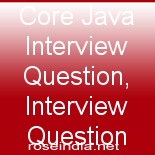Core Java Interview Question Page 12
Question: What is a transient variable?
Answer: A transient variable is a variable that may not be serialized.
Question: Which containers use a border Layout as their default layout?
Answer: The window, Frame and Dialog classes use a border layout as their default layout.
Question: Why do threads block on I/O?
Answer: Threads block on i/o (that is enters the waiting state) so that other threads may execute while the i/o Operation is performed.
Question: How are Observer and Observable used?
Answer: Objects that subclass the Observable class maintain a list of observers. When an Observable object is updated it invokes the update() method of each of its observers to notify the observers that it has changed state. The Observer interface is implemented by objects that observe Observable objects.
Question: What is synchronization and why is it important?
Answer: With respect to multithreading, synchronization is the capability to control the access of multiple threads to shared resources. Without synchronization, it is possible for one thread to modify a shared object while another thread is in the process of using or updating that object's value. This often leads to significant errors.
Question: Can a lock be acquired on a class?
Answer: Yes, a lock can be acquired on a class. This lock is acquired on the class's Class object.
Question: What's new with the stop(), suspend() and resume() methods in JDK 1.2?
Answer: The stop(), suspend() and resume() methods have been deprecated in JDK 1.2.
Question: Is null a keyword?
Answer: The null value is not a keyword.
Question: What is the preferred size of a component?
Answer: The preferred size of a component is the minimum component size that will allow the component to display normally.
Question: What method is used to specify a container's layout?
Answer: The setLayout() method is used to specify a container's layout.
Question: Which containers use a FlowLayout as their default layout?
Answer: The Panel and Applet classes use the FlowLayout as their default layout.
Question: What state does a thread enter when it terminates its processing?
Answer: When a thread terminates its processing, it enters the dead state.
Question: What is the Collections API?
Answer: The Collections API is a set of classes and interfaces that support operations on collections of objects.
Question: Which characters may be used as the second character of an identifier, but not as the first character of an identifier?
Answer: The digits 0 through 9 may not be used as the first character of an identifier but they may be used after the first character of an identifier.
Question: What is the List interface? 0
Answer: The List interface provides support for ordered collections of objects.
Question: How does Java handle integer overflows and underflows?
Answer: It uses those low order bytes of the result that can fit into the size of the type allowed by the operation. 1
Question: What is the Vector class?
Answer: The Vector class provides the capability to implement a growable array of objects
Question: What modifiers may be used with an inner class that is a member of an outer class? 2
Answer: A (non-local) inner class may be declared as public, protected, private, static, final, or abstract.



